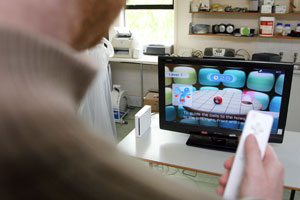
Playing the Wii-Fit could help the most frail in society
Playing the Nintendo Wii-Fit could have an unexpected benefit for the frailest people in society, according to new research from Essex.
The research, published in the Journal of American Geriatrics Society, offers real hope for recurrent fallers who are often too frail to take part in conventional physiotherapy to help improve their mobility because they are not strong or fit enough.
With recurrent fallers costing the NHS nearly £1.7 billion every year in terms of inpatient admissions and long-term care costs, it is a real health issue.
There are a number of reasons why some elderly people fall – from frailty and lack of confidence to lack of practice moving about and other mobility issues. However, the knock-on effect can lead to them feeling anxious and less likely to move about, which can have a negative effect on their quality of life and lead to low mood/depression.
Previous exer-gaming research at Essex found the Wii was an effective method of helping improve the balance of elderly people who are recurrent fallers. What the new research wanted to find out was why.
Researchers Dr Murray Griffin and Dr Matt Taylor, from the School of Biological Sciences at Essex, found that the Wii was a successful treatment for fallers, not because it made the patients fitter than doing conventional physiotherapy alone, but because it helped improve and reconstruct the skills needed to prevent the patients falling.
In fact, the research showed that patients using the Wii-Fit used 30% less energy than standard physiotherapy interventions for fallers – meaning it could be a potential valuable pre-physio/training intervention for the most vulnerable fallers who were too frail to take part in standard physio treatments.
Dr Griffin said: “This offers a real hope to some of the most vulnerable and elderly people in society whose frailty seriously impacts on their quality of life and their access to interventions which could greatly improve their balance and quality of life.
“With the Wii involving the patients using less energy than standard physiotherapy it means this intervention could help the most vulnerable to improve their balance skills.”
The research team is now hoping to extend this research to carry out a study in people’s homes post-falls prevention physiotherapy to see if the Wii proves to be a useful tool to help them maintain their mobility.
Ends
Note to editors
For further information or to interview Dr Murray Griffin or Dr Matthew Taylor, please contact the University of Essex Communications Office on 01206 872400 or e-mail comms@essex.ac.uk.